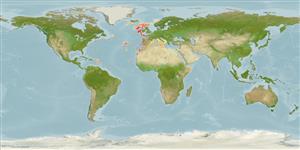Actinopterygii (ray-finned fishes) >
Perciformes (Perch-likes) >
Trichiuridae (Cutlassfishes) > Aphanopodinae
Etymology: Benthodesmus: Greek, benthos = depth of the sea + Greek, desmos = bond, chain (Ref. 45335); simonyi: Named after Prof. Oskar Simony of Mathematics and Physics, Hochschule für Bodenkultur, Vienna, eclectic and collector (Ref. 6885).
Environment / Climate / Range
Ecology
Marine; benthopelagic; depth range 200 - 900 m (Ref. 6181). Deep-water, preferred ?; 72°N - 16°N, 67°W - 20°E (Ref. 6181)
North Atlantic: off Newfoundland (Canada), Bermuda, New England (USA), Middle Atlantic Ridges, Iceland, Norway, Portugal, Madeira, and Canary Islands.
Size / Weight / Age
Maturity: Lm ? range ? - ? cm
Max length : 130 cm SL male/unsexed; (Ref. 6181)
Found on continental slope and underwater rises. Juveniles mesopelagic.
Life cycle and mating behavior
Maturity | Reproduction | Spawning | Eggs | Fecundity | Larvae
Nakamura, I. and N.V. Parin, 1993. FAO Species Catalogue. Vol. 15. Snake mackerels and cutlassfishes of the world (families Gempylidae and Trichiuridae). An annotated and illustrated catalogue of the snake mackerels, snoeks, escolars, gemfishes, sackfishes, domine, oilfish, cutlassfishes,. scabbardfishes, hairtails, and frostfishes known to date. FAO Fish. Synop. 125(15):136 p. (Ref. 6181)
IUCN Red List Status (Ref. 115185)
CITES (Ref. 94142)
Not Evaluated
Threat to humans
Harmless
Human uses
More information
ReferencesAquacultureAquaculture profileStrainsGeneticsAllele frequenciesHeritabilityDiseasesProcessingMass conversion
Tools
Special reports
Download XML
Internet sources
Estimates of some properties based on models
Phylogenetic diversity index (Ref.
82805): PD
50 = 0.5005 [Uniqueness, from 0.5 = low to 2.0 = high].
Bayesian length-weight: a=0.00012 (0.00006 - 0.00023), b=3.06 (2.88 - 3.24), in cm Total Length, based on LWR estimates for this species & (Sub)family-body (Ref.
93245).
Trophic Level (Ref.
69278): 4.3 ±0.7 se; Based on size and trophs of closest relatives
Resilience (Ref.
69278): Low, minimum population doubling time 4.5 - 14 years (Assuming tmax>10).
Vulnerability (Ref.
59153): High vulnerability (56 of 100) .
